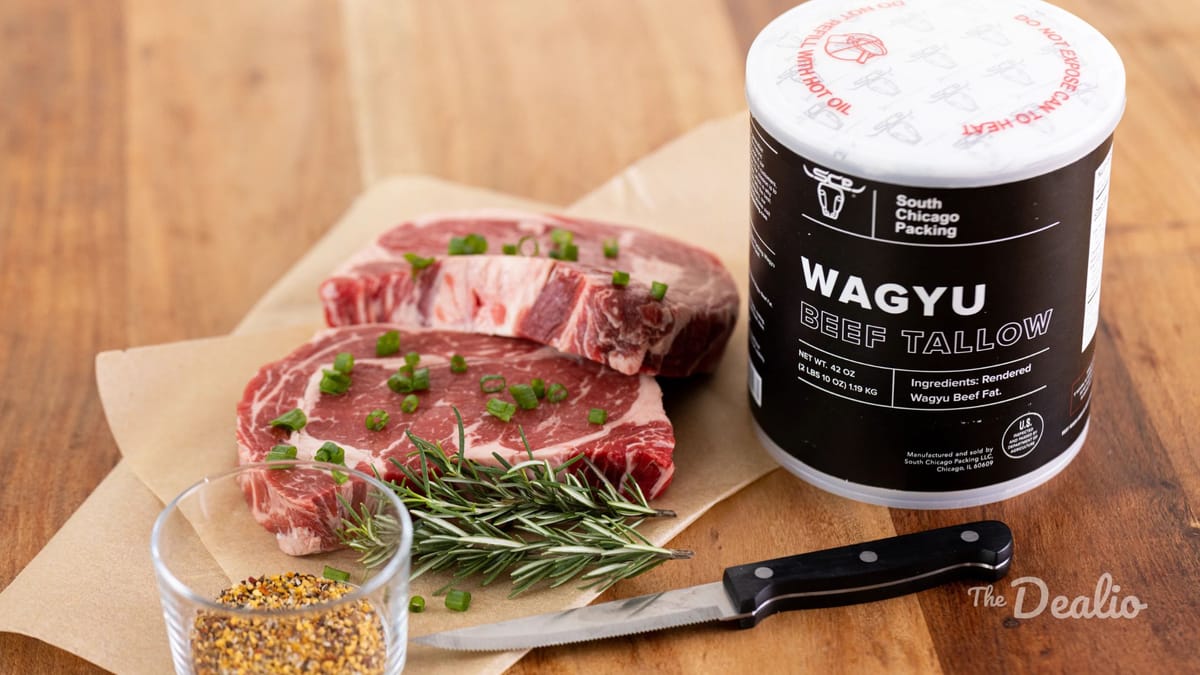Wagyu Beef Tallow: The Luxurious Fat Revolutionizing Kitchens

Wagyu beef tallow is making waves in the culinary world, but what exactly is it? It might not be the first thing you reach for in your pantry. This guide will explain what makes wagyu beef tallow so special, covering everything from its unique properties to its best uses in and out of the kitchen.
Wagyu beef tallow offers a luxurious cooking experience. This isn't just a passing trend; it's a return to traditional cooking fats, offering exciting benefits.
Decoding Wagyu Beef Tallow
Tallow is simply rendered beef fat. The rendering process involves gently heating the fat to separate it from connective tissue and other non-fat components.
Wagyu cattle, originating from Japan, are renowned for high levels of intramuscular fat, leading to intense marbling. This marbling is what gives the beef its tenderness and rich flavor, qualities that extend to its tallow.
Why Choose Wagyu Beef Tallow?
The most significant difference between Wagyu beef tallow and other kinds is the flavor. Wagyu has a distinctive, rich, umami flavor that is imparted to the tallow.
Wagyu tallow also tends to have a slightly lower melting point. A5 wagyu, for instance, has a melting point near 77° Fahrenheit, with other Wagyu types potentially melting at even lower temperatures, notably less than the 95° to 104° range of standard beef tallow.
Here's a direct comparison:
| Property | Wagyu Beef Tallow | Standard Beef Tallow | Lard |
|---|---|---|---|
| Flavor | Rich, buttery, umami | Mildly beefy | Neutral to slightly porky |
| Melting Point | Lower (around 77°F/25°C for some types, like A5) | Higher (95-104°F/35-40°C) | 86 - 104° F (30° to 40° C) |
| Texture at Room Temp | Softer, often semi-solid | Firmer, solid | Firm |
| Typical Uses | High-heat cooking, frying, roasting, finishing | High-heat cooking, frying, baking, some traditional recipes | Baking, Pastries, Cooking (especially regional cuisines) |
The Fat Breakdown: What Makes Wagyu Special
Wagyu cattle possess a genetic predisposition for higher levels of monounsaturated fats. This results in a different fatty acid balance in wagyu beef tallow.
Here’s what distinguishes the fat in Wagyu:
- Higher Monounsaturated Fat: This beneficial fat, also found in avocados, likely contributes to the lower melting point of Wagyu tallow.
- Conjugated Linoleic Acid (CLA): Research suggests Wagyu may contain higher levels of CLA, influenced by various factors.
Cooking with Wagyu Beef Tallow: Practical Applications
Wagyu beef tallow excels in high-heat applications. Consider searing, frying, and even baking.
Searing Steaks to Perfection
The high smoke point of wagyu beef tallow is ideal for achieving a beautiful sear on steaks. The inherent richness adds depth of flavor.
Frying with Flair
Use Wagyu tallow for an extra flavor boost when frying. If you enjoy using different cooking oils, you'll appreciate the taste of foods fried in Wagyu tallow.
Wagyu beef tallow can give fries, or even candied bacon, a much more refined and complex taste.
Beyond Savory: Wagyu Tallow in Baking
While it may sound unusual, using tallow in baking can yield wonderful results. It is known for clean flavor and has a high smoke point for pastry and crust applications.
South Chicago Packing features desserts like chocolate cake and pie crusts made with tallow on their recipe page.
Wagyu Beef Tallow Beyond the Kitchen
The applications of beef tallow extend beyond the culinary world. It has even been tested by Amtrak as a potential biofuel.
Wagyu Tallow in Skincare
Tallow, including wagyu tallow, can be found in skincare products. It is gaining popularity and finding a purpose with moisturizing qualities.
You can find it in artisanal soaps, lotions, and balms.
Sustainable Choices
The "nose-to-tail" movement emphasizes minimizing waste. Buying Wagyu tallow supports this approach, maximizing the use of the whole animal.
Many find that using wagyu beef fat helps create more sustainability.
Where to Get Your Wagyu Beef Tallow
If you're eager to try wagyu beef tallow, finding it is your next step. Although gaining popularity, it's not yet a common supermarket item, so consider these options:
Finding Specialty Suppliers
Here are a few places to look:
- Butcher Shops: High-end or specialty butcher shops are a prime option. If they stock Wagyu beef, inquire about tallow availability, either pre-rendered or as beef fat for home rendering.
- Online Retailers: Several online sources, such as Booth Creek Wagyu and South Chicago Packing, offer Wagyu tallow for shipping, often with various size and pricing options. This includes wholesale opportunities for those looking to buy in larger quantities.
- Farmers Markets: Local farmers markets featuring ranchers raising Wagyu cattle may offer tallow. It's a great way to support local agriculture and obtain a high-quality product.
Keep in mind that online retailers often have a variety of wagyu tallow products. You might find different grades, including American Wagyu beef tallow. Check for any customer reviews for better shopping.
Can you DIY? Making Tallow at Home (with Caution)
Making your own tallow is possible, but here are key considerations:
- Source Quality Wagyu Fat: Prioritize obtaining high-quality Wagyu fat from a trusted butcher. They can guide you on the best trim for rendering.
- The Rendering Process: This involves low, slow heat to melt the fat and strain out solids. Specific instructions can be easily found online.
- Be Patient and Mindful of Cleanliness: Impurities and remaining connective tissue can impact the final product's quality and shelf life. Thorough straining is crucial.
FAQs about wagyu beef tallow
What is wagyu beef tallow good for?
Wagyu beef tallow is incredibly versatile. Many appreciate its flavor, high smoke point, and unique fat profile for cooking applications such as frying and searing.
It can be used for baking to add a very subtle richness.
Is wagyu tallow healthier than butter?
Wagyu tallow tends to have more monounsaturated fats. Both butter and tallow offer unique flavors and suit various uses, and nutritional needs differ among people.
Do I need to refrigerate wagyu beef tallow?
Refrigeration extends the shelf life of Wagyu beef tallow. Properly rendered and stored in an airtight container, it can last for weeks at room temperature, and even longer when refrigerated.
Why did we stop using beef tallow?
Beef tallow use declined with the rise of vegetable oils. These alternatives were sometimes marketed as more convenient.
Changing dietary trends contributed, though there's a renewed interest in traditional fats like tallow today. South Chicago Packing's line of products reflects this revival.
Conclusion
Wagyu beef tallow is a high-end cooking fat with historical roots, now sought after for its distinct advantages. While it's part of a balanced approach to cooking, its rich flavor and versatility make it a compelling choice for those looking to elevate their culinary creations, from a perfectly seared ribeye steak to classic roasted potatoes.
With companies like Booth Creek Wagyu offering a range of options, from ground beef to luxurious filet mignon and tallow, home cooks can find various choices. It's easy to find through their online shop by adding to your shopping cart and finalizing your purchases at the shopping cart close. Explore their product pages, like those detailing price unit price / or regular price sale price to make informed decisions, or explore their butcher's blog.
Please subscribe to The Dealio and become a Dealio Member to unlock commenting, participate in exclusive polls, and automatically enter to win monthly drawings!

![Time Blocking vs Time Boxing: [Boost Your Productivity In 2025]](/content/images/size/w600/2025/03/Time-Blocking-vs-Time-Boxing.jpg)


